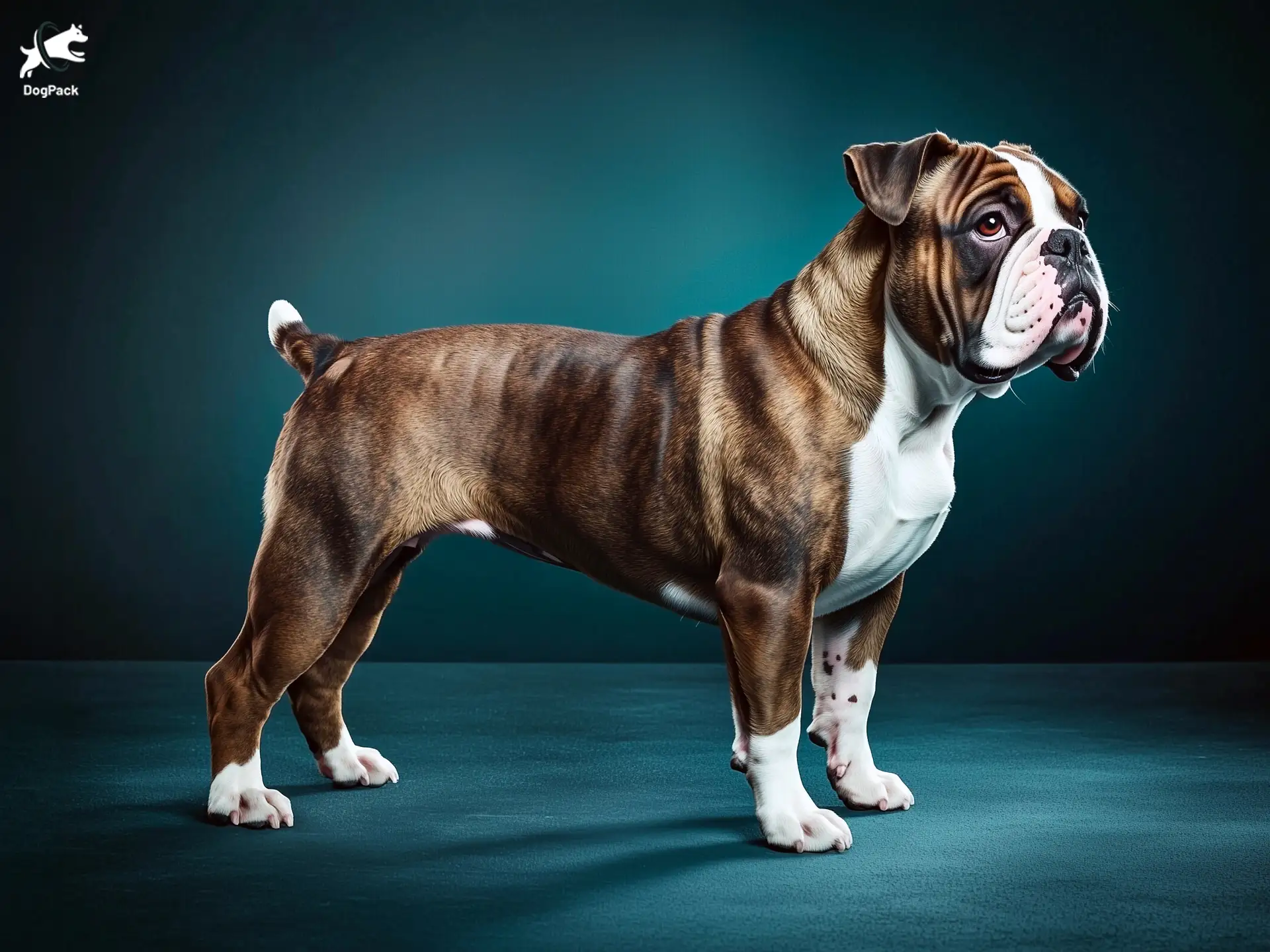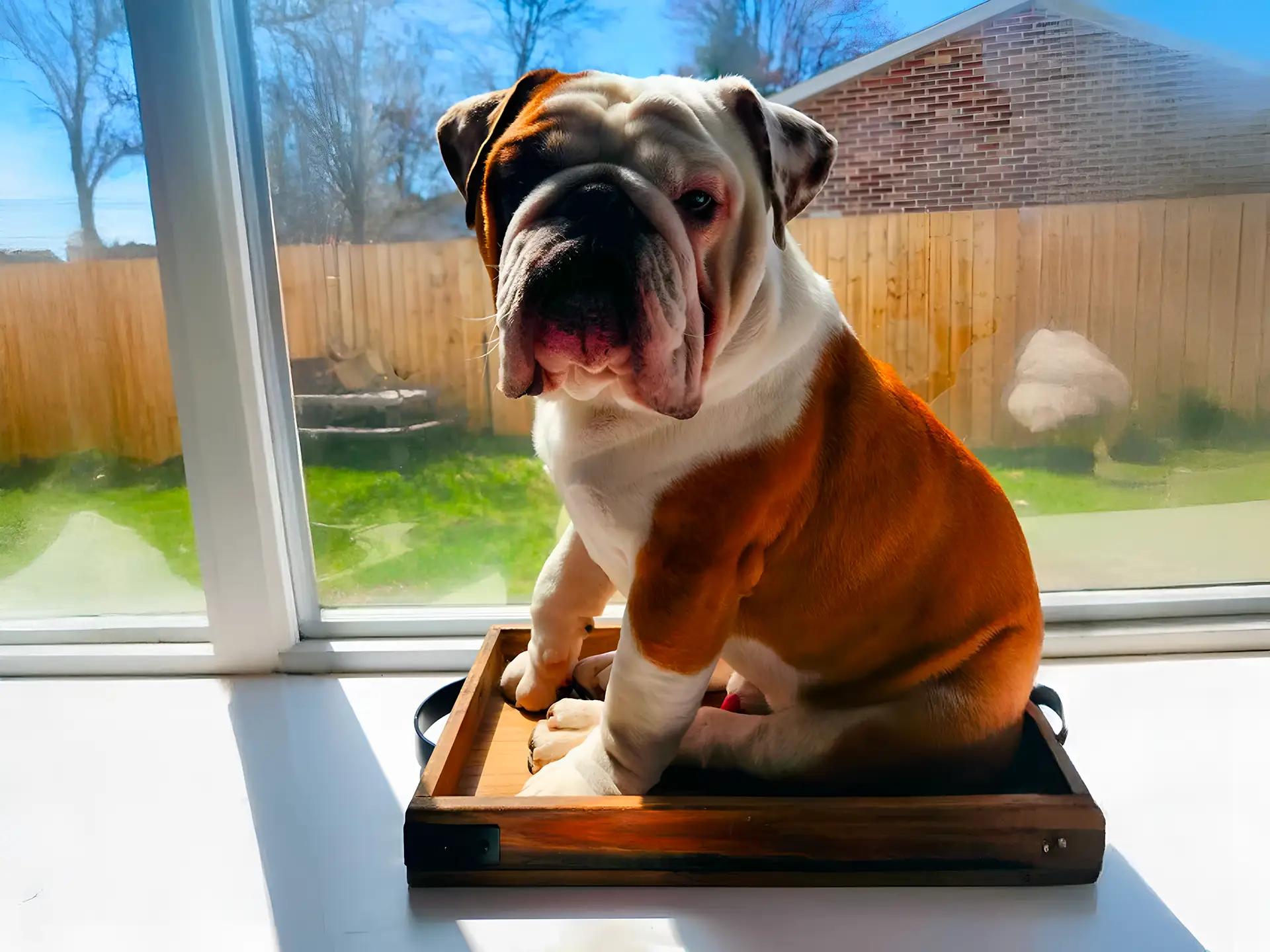British Bulldog Dog Breed Info & Overview
The British Bulldog is a medium-sized, stocky breed, easily recognized by its wrinkled face and endearing personality. Originally from England, this gentle companion is well-suited for families, apartment living, and first-time dog owners. With a relaxed temperament and loyal nature, the British Bulldog makes a lovable and low-maintenance addition to any home.
Characteristics
Pictures
Breed History
Believe it or not, the British Bulldog’s ancestors weren’t always the couch-loving companions we adore today. Originating in England during the 13th century, these stout-hearted canines were bred for the grueling sport of bull-baiting. Talk about a rough day at the office!
After bull-baiting was banned in 1835, the British Bulldog faced an identity crisis—no more bulls to chase meant it was time for a career change. Thankfully, breeders with a soft spot for these wrinkly faces began selecting for gentler traits. The result? A lovable, laid-back pooch that swapped the arena for the living room sofa.
Fast forward to today, and the British Bulldog has become an endearing symbol of British culture—resilient, a bit stubborn, but utterly charming. They’ve traded in their gladiator past for a role as one of the most affectionate companions around. Not a bad retirement plan, if you ask me.
Temperament, Personality
The British Bulldog is renowned for its gentle and affectionate temperament. Despite their tough exterior, they’re real softies at heart. These dogs thrive on human companionship and are happiest when snuggled up next to you on the couch—Netflix binge, anyone?
With kids, British Bulldogs are the definition of patient and tolerant, making them excellent family pets. They enjoy playtime but are also perfectly content with a lazy afternoon nap. Their calm demeanor means they generally get along well with other pets, especially if they’ve been properly introduced.
When it comes to strangers, they might play it cool at first. They’re not the type to jump up and lick every visitor’s face but will warm up once they sense there’s no threat. Their laid-back personality makes them adaptable to various social situations, contributing to their popularity as companion animals.
Physical Characteristics
The British Bulldog is a medium-sized breed with a muscular, robust build—think of them as the bodybuilders of the canine world. They have a broad chest, strong limbs, and a distinctive rolling gait that gives them a unique swagger.
Their coat is short, smooth, and lies close to the body, requiring minimal grooming. British Bulldogs come in a variety of colors, including brindle, white, red, fawn, or a charming combination. Their small, floppy ears and underbite add to their distinctive, somewhat comical expression.
Let’s not forget their signature wrinkled face and pushed-in nose. These features give the British Bulldog an endearing, sometimes grumpy look that belies their sweet nature. It’s no wonder they’ve become iconic—you can’t mistake a British Bulldog for any other breed!
Health Issues
British Bulldogs are prone to certain health issues due to their unique physique. Brachycephalic airway syndrome is common, thanks to those adorable smooshed faces, which can lead to breathing difficulties. It’s best to keep them cool and avoid strenuous activities, especially in hot weather.
Joint problems like hip and elbow dysplasia are also prevalent. Regular vet check-ups and maintaining a healthy weight can help keep those joints in tip-top shape. A balanced diet and avoiding overfeeding are key—no matter how convincing those puppy eyes are!
Their skin folds, while cute, can harbor bacteria if not cleaned regularly. A gentle wipe-down of their wrinkles can prevent infections and keep your British Bulldog feeling fresh. Eye conditions like cherry eye or entropion may also occur, so early detection and prompt veterinary care are crucial.
Grooming Needs
Good news for the grooming-averse: British Bulldogs have relatively low grooming needs! Their short, smooth coat benefits from a weekly brush to remove loose hairs and keep them looking dapper. Shedding is moderate, so your lint roller won’t get a full workout.
Those charming wrinkles and skin folds do need some TLC. Regular cleaning with a damp cloth prevents moisture buildup and pesky infections. Just make sure to dry the folds thoroughly afterward—nobody likes a damp wrinkle!
Bath time can be as infrequent as every few months unless your pup decides to roll in something unsavory. Don’t forget regular nail trims, ear checks, and dental care to keep your British Bulldog in tip-top condition. Overall, their grooming routine is straightforward and manageable.
Exercise Requirements
Despite their stocky build, British Bulldogs are more about that chill life. They require about 20 to 30 minutes of moderate exercise each day to stay healthy. A leisurely stroll around the block or a gentle game of fetch in the backyard suits them just fine.
Due to their brachycephalic nature, it’s important to avoid intense exercise, especially when it’s hot or humid. Overexertion can lead to breathing difficulties—no one wants a panting pup! Indoor play or puzzle toys can be excellent alternatives on warmer days.
Remember, they can be a bit lazy (aren’t we all sometimes?), so encouraging regular, gentle activity helps maintain their weight and overall health. But don’t worry—they’re just as happy cuddling up with you for some quality downtime.
Training Tips
Training a British Bulldog is a lesson in patience and perhaps a bit of humor. They can be stubborn, so positive reinforcement with treats and praise works wonders. After all, who doesn’t like a little bribery now and then?
Keep training sessions short and sweet to match their attention span. Consistency is key—repetition helps these lovable loafers grasp new commands. Housebreaking might take some time, so establishing a routine early on is essential.
While they may not win any agility contests, British Bulldogs are eager to please their favorite humans. Focus on basic obedience and good manners, and you’ll have a well-behaved companion. Just remember to keep it fun and never harsh; they’re sensitive souls under that tough exterior.
Nutrition, Diet
Feeding a British Bulldog requires a bit of culinary consideration. Due to their tendency to gain weight, monitoring calorie intake is crucial. A high-quality dog food formulated for medium-sized breeds with moderate energy levels is ideal.
Typically, an adult British Bulldog needs about 1.5 to 2 cups of dry kibble per day, split into two meals. Portion control helps prevent obesity—a common issue in the breed. Always consult your vet to tailor the diet to your dog’s specific needs and activity level.
Bulldogs can be prone to food sensitivities, so opting for easily digestible ingredients may save you both some discomfort. Steer clear of table scraps and high-fat treats, no matter how persuasive that wrinkly face can be!
Adoption, Breeders
If you’re smitten with the British Bulldog, finding a reputable breeder or considering adoption is the next step. Reputable breeders focus on the health and temperament of their dogs, ensuring you get a happy, healthy pup.
Look for breeders who perform health screenings for common Bulldog issues and are open about their breeding practices. Visiting the breeder’s facility to meet the puppy’s parents can give you valuable insights. The Bulldog Club of America is an excellent resource for breeder recommendations.
Adoption is another fantastic option. Many British Bulldogs are in need of loving homes through rescue organizations. Check out the Bulldog Rescue Network to find a furry friend waiting to join your family.
Family Pet?
The British Bulldog is a family favorite for good reason. Their affectionate and patient nature makes them wonderful companions for kids of all ages. They’re the kind of dog that’ll happily endure a tea party with the little ones or lounge during family movie night.
With other pets, they generally play well with others, especially when socialized early. Their easygoing personality reduces the likelihood of household drama—peaceful coexistence is their jam.
Whether your household is bustling or laid-back, the British Bulldog adapts with ease. They thrive on being part of the family’s daily life and bring a sense of joy and calm wherever they go.
Right For You?
So, is the British Bulldog the missing piece in your life puzzle? If you’re looking for a low-energy companion who enjoys the simple pleasures—like a good nap—they could be your perfect match. They’re well-suited for apartment living and adapt well to various home environments.
Keep in mind their health considerations. Regular vet visits and a bit of extra care for their unique features are part of the package. Their sensitivity to extreme temperatures means they’ll appreciate a comfy indoor spot—preferably right next to you.
If you value loyalty, a dash of stubborn charm, and a whole lot of love, the British Bulldog might just be the canine companion you’ve been dreaming of.
Conclusion
With their lovable nature and iconic appearance, the British Bulldog offers a unique blend of charm and companionship. They’re adaptable to various living situations, from busy families to solo seniors. While they come with specific care needs, the affection and loyalty they provide are truly rewarding. If you’re seeking a gentle, devoted friend who enjoys the comforts of home as much as you do, the British Bulldog could be the perfect breed for you.
FAQs
-
Are British Bulldogs good with apartment living?
Yes, British Bulldogs adapt well to apartment living due to their low exercise needs and calm demeanor. They’re content with short walks and indoor relaxation, making them suitable for smaller spaces.
-
Do British Bulldogs snore a lot?
They sure do! British Bulldogs are prone to snoring because of their short noses and airway structure. Their endearing snores are just part of their charm—think of it as canine white noise.
-
How do I care for a British Bulldog’s wrinkles?
Gently clean their wrinkles daily with a damp cloth to remove dirt and moisture. Ensure you dry the folds thoroughly afterward to prevent infections—it’s a small task that keeps them comfortable.
-
Are British Bulldogs hypoallergenic?
No, British Bulldogs are not hypoallergenic. They shed moderately and produce dander, which can trigger allergies in sensitive individuals. Consider allergy-friendly breeds if this is a concern.
-
How long can a British Bulldog be left alone?
British Bulldogs prefer company and may experience separation anxiety if left alone too long. It’s best not to leave them alone for more than 4 to 6 hours to keep them happy and prevent stress.
Breed Ratings
Moderately intelligent but can be stubborn. With patience and tasty treats, they’ll catch on to basic commands.
Enjoys playtime in short bursts but equally loves lounging. Perfect for both play and relaxation.
Low-energy and appreciates a good nap. Short walks and gentle play suffice for this laid-back breed.
Moderate shedding. Regular brushing keeps their coat healthy and your furniture less hairy.
Low prey drive. Unlikely to chase squirrels, but may give a curious glance.
Simple grooming needs. Just remember to keep those wrinkles clean and dry!
Can be a bit headstrong. Positive reinforcement and consistency are key.
Prefers not to be alone for extended periods. They’re social butterflies at heart.
Generally quiet. Your neighbors will appreciate their low barking tendencies.
Drool happens. Keep a towel handy for those slobbery moments.
Gets along well with other dogs, especially with early socialization.
Prone to certain health issues. Regular vet care is important to keep them thriving.














